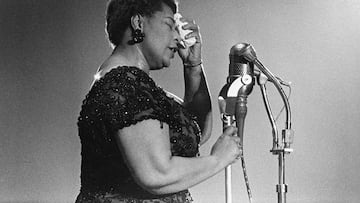Who was the first Black woman to win a Grammy award?
With the Grammys taking place during Black History Month, we looked at the illustrious career of Ella Fitzgerald, the first Black woman to win a Grammy.


Tonight, the Recording Academy will host the 65th Annual Grammy Awards.
At the Grammys’ inaugural show in the late 1950s, Ella Fitzgerald took home two of what would become thirteen awards over the course of her career.
During that ceremony, Fitzgerald won for:
- Best Jazz Performance, Individual: Ella Fitzgerald Sings the Duke Ellington Songbook
- Best Vocal Performance, Female: Ella Fitzgerald Sings the Irving Berlin Songbook.
The latter also earned her a nomination for ‘Album of the Year.’ Fitzgerald would go on to win another eleven Grammys, none of which were for Album of the Year, and a Lifetime Achievement Award.
What Grammy awards did Ella Fitzgerald win?
- Grammy Award for Best Jazz Performance, Soloist:
- Ella Fitzgerald for Ella Fitzgerald Sings the Duke Ellington Songbook (1958)
- Ella Fitzgerald for Ella Swings Lightly (1959)
- Grammy Award for Best Female Pop Vocal Performance:
- Ella Fitzgerald for Ella Fitzgerald Sings the Irving Berlin Songbook (1958)
- Ella Fitzgerald for But Not for Me (from Ella Fitzgerald Sings the George and Ira Gershwin Songbook (1959):
- Ella Fitzgerald for Ella in Berlin: Mack the Knife (1960)
- Ella Fitzgerald for Mack the Knife (from Ella in Berlin: Mack the Knife) (1959)
- Ella Fitzgerald for Ella Swings Brightly with Nelson (1962)
- Ella Fitzgerald for A Perfect Match (1980)
- Grammy Award for Best Jazz Vocal:
- Ella Fitzgerald for Fitzgerald and Pass... Again (1976)
- Ella Fitzgerald for Fine and Mellow (1979)
- Grammy Award for Best Jazz Vocal Performance, Female:
- Ella Fitzgerald for Digital III at Montreux (1981)
- Ella Fitzgerald for The Best Is Yet to Come (1983)
- Ella Fitzgerald for All That Jazz (1990)
- Grammy Award for Best Historical Album
- Ella Fitzgerald for The Complete Ella Fitzgerald Songbooks (1995)
Recording Academy accused of racial bias
This year the Grammys fall during Black History Month, and some racial justice advocates have called attention to racial bias within the music industry, in many ways, represented by the industry’s largest awards.
These come in addition to long-standing critiques of the Grammy Awards for being a commercial event for the music industry to promote itself.
A recent report found that from 2012 to 2020, Black artists represented thirty-eight percent of artists whose songs made it to the Billboard Hot 100 but only 26.6 percent of Grammy nominations. Of these nominees, an even smaller percentage would go on to win their awards. Additionally, the reliance on mainstream success also works to normalize good music with solid followings that do not get enough radio plays or streams to make on these lists.
Even the way the Recording Academy categorizes music by Black artists has received criticism.
In 2020, Tyler, the Creator, voiced his opinions on his music being classified as ‘urban’ instead of ‘pop.’
“It sucks that whenever we — and I mean guys that look like me — do anything that’s genre-bending or that’s anything they always put it in a rap or urban category. I don’t like that ‘urban’ word — it’s just a politically correct way to say the n-word to me,” said the artist.
He continued by asking, “why can’t we be in pop?”
“Half of me feels like the rap nomination was just a backhanded compliment. Like, my little cousin wants to play the game. Let’s give him the unplugged controller so he can shut up and feel good about it — that’s what it felt like a bit.”
Tyler, the Creator
Recording Academy works to expand membership
In 2020, it became public that the Hollywood Foreign Press Association had zero Black members. Similar reporting from the New York Times showed a similar lack of transparency with regard to the formation of nominating and voting committees.
Related stories
In June 2022, the organization announced that it had sent 2,000 people to innovations to become voting members. The Recording Academy’s Vice President of Membership and Industry relations, Kelley Purcell, said their “new members symbolize the future of the Academy and represent the direction we are headed in as an organization and the music community at large.”
🎶 Congratulations to the 2,700+ music professionals from wide-ranging backgrounds, genres, and disciplines, who received a membership invitation from the #RecordingAcademy.
— Recording Academy / GRAMMYs (@RecordingAcad) June 28, 2022
✨ Membership powers our Academy. Learn more at https://t.co/TSoN9OqOYZ #IAmTheAcademy pic.twitter.com/adbjTv2hVE
been “Their new ideas, recommendations, and observations help us drive positive progress as we continue our evolution,” said Purcell. Next week’s event will be the Recording Academy’s first opportunity to see the impacts of this first step in recognizing the work of Black artists whose work has been marginalized and appropriated without any recognition for decades.

